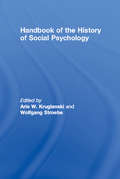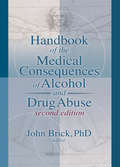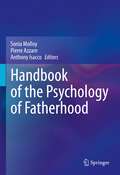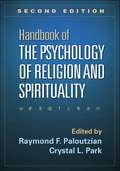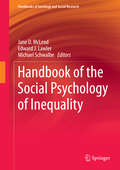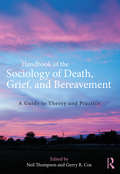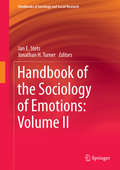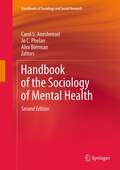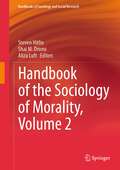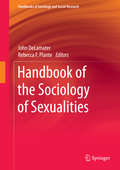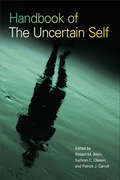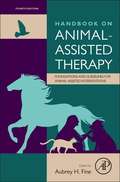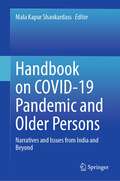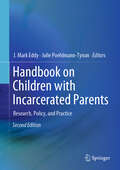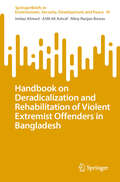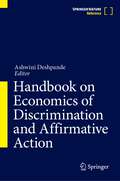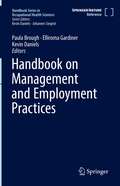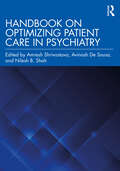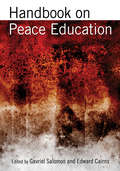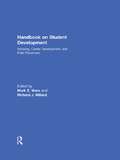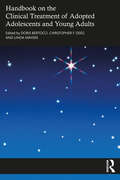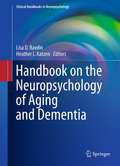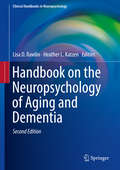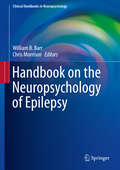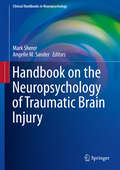- Table View
- List View
Handbook of the History of Social Psychology
by Arie W. Kruglanski Wolfgang StroebeFor the first time in the history of social psychology, we have a handbook on the history of social psychology. In it, leading luminaries in the field present their take on how research in their own domains has unfolded, on the scientists whose impact shaped the research agendas in the different areas of social psychology, and on events, institutions and publications that were pivotal in determining the field’s history. Social psychology’s numerous subfields now boast a rich historical heritage of their own, which demands special attention. The Handbook recounts the intriguing and often surprising lessons that the tale of social psychology’s remarkable ascendance has to offer. The historical diversity is the hallmark of the present handbook reflecting each of this field’s domains unique evolution. Collectively, the contributions put a conceptual mirror to our field and weave the intricate tapestry of people, dynamics and events whose workings combined to produce what the vibrant discipline of social psychology is today. They allow the contemporary student, scholar and instructor to explore the historical development of this important field, provide insight into its enduring aims and allow them to transcend the vicissitudes of the zeitgeist and fads of the moment. The Handbook of the History of Social Psychology provides an essential resource for any social psychologist’s collection.
Handbook of the Medical Consequences of Alcohol and Drug Abuse
by John BrickThe essential newly-expanded reference that needs to be on the desk of every health care professional who encounters substance abusers.Handbook of the Medical Consequences of Alcohol and Drug Abuse, Second Edition is the newly-updated classic reference text that provides even more detailed and expanded information on the pharmacological, toxicological, and neuropsychological consequences of alcohol and drug abuse. Eight new chapters of crucial information have been added. Written by leading experts in the fields of medical physiology, psychopharmacology, and neuropsychology, this valuable resource provides the detailed alcohol and drug information health professionals in all fields need to know. Handbook of the Medical Consequences of Alcohol and Drug Abuse, Second Edition greatly expands on the expert information provided in the first edition. This text provides reviews of the cardiovascular, neurological, pulmonary, gastrointestinal, psychological, and hepatic effects of commonly abused drugs. The book also provides in-depth explanations of the mechanisms by which these psychoactive drugs exert their biobehavioral effects as well as current thinking about—and definitions of—abuse, dependence, and alcohol/drug use. The Handbook of the Medical Consequences of Alcohol and Drug Abuse, Second Edition includes vital information on: alcohol, including definitions of alcohol use, abuse, and dependence the relationship between alcohol and accidental injuries, alcohol’s effect on skeletal and major organ systems, and its effect on risk factors for certain cancers effects of alcohol and other drugs on neuropsychological function the effects of alcohol on neuron signaling, neurotransmitter function, and alcoholic brain damage and cognitive dysfunction fetal alcohol effects chronic effects of marijuana use on psychological and physical health, including a fair and balanced discussion of the medical marijuana issue the consequences of opiate abuse and methadone pharmacotherapy, including a comparison of the effects of methadone and heroin on organ systems cocaine’s history, the various forms of the drug, and the adverse effects of cocaine on cardiovascular, neurologic, and pulmonary systems the medical consequences of inhalants ranging from benzene to xylene the prenatal effects of nicotine, cocaine, marijuana, and opiates terminology that appears in the current literature on alcohol New topics in the Handbook of the Medical Consequences of Alcohol and Drug Abuse, Second Edition include chapters discussing: chemical dependency in psychiatric patients medical consequences of steroids OTC medications hallucinogens health effects of tobacco, nicotine, and exposure to tobacco smoke interactions of alcohol with other drugs and other medications periodontal effects of alcohol and drug abuse in the oral cavity imaging studies of structural brain changes The Handbook of the Medical Consequences of Alcohol and Drug Abuse, Second Edition is an invaluable resource for physicians, scientists, nurses, psychologists, and alcohol and drug counselors.
Handbook of the Psychology of Fatherhood
by Anthony Isacco Sonia Molloy Pierre AzzamThis handbook examines the psychology of fatherhood throughout the lifespan and across multiple contexts. It synthesizes the trajectory of research and theorization of fathering that has traditionally dominated fatherhood literature. The book explores fathering within the developmental stages of children, from infancy to adulthood. In addition, it addresses the health and well-being of fathers from the perinatal period onward, with a focus on isolation, loss, trauma, and mental and physical health. The book emphasizes positive fatherhood and masculinity, thereby offering new perspectives of fatherhood. It synthesizes cutting-edge research on the intersectionality of fathering and provides knowledge of fatherhood for diverse populations, including military, LGBTQ, and fathers on the margins. The handbook reviews clinical assessment as well as community-based prevention and intervention strategies for issues of fatherhood and examines directions for future public policy and on-the-ground work. It offers recommendations for promoting the health and well-being of fathers and their families from multiple perspectives. Key areas of coverage include:Historical, multicultural, and future directions in the research of fatherhood.Fatherhood and child development, from infancy to emerging adulthood.Grandfathering and adult children.Fatherhood and men’s mental and physical health and well-being.Positive masculinity and fatherhood. The Handbook of the Psychology of Fatherhood is an invaluable resource for researchers, clinicians and practitioners, and policy advocates as well as graduate students in developmental psychology, social work, public health, pediatrics, human development, family studies, child and adolescent psychiatry, school and educational psychology, and all interrelated disciplines.
Handbook of the Psychology of Religion and Spirituality, Second Edition
by Raymond F. Paloutzian Crystal L. ParkWidely regarded as the definitive reference, this volume comprehensively examines the psychological processes associated with religion and spirituality. Leading scholars from multiple psychological subdisciplines present developmental, cognitive, social psychological, cultural, and clinical perspectives on this core aspect of human experience. The forms and functions of religious practices and rituals, conversion experiences, and spiritual struggles are explored. Other key topics include religion as a meaning system, religious influences on prosocial and antisocial behavior, and connections to health, coping, and psychotherapy.New to This Edition*Two chapters on cross-cultural issues.*Chapters on spiritual goals, emotional values, and mindfulness.*Reflects significant theoretical and empirical developments in the field.*Many new authors and extensively revised chapters.*Robust index amplifies the volume's usefulness as a reference tool.
Handbook of the Social Psychology of Inequality
by Jane D. Mcleod Michael Schwalbe Edward J. LawlerThis volume provides the first comprehensive overview of social psychological research on inequality for a graduate student and professional audience. Drawing on all of the major theoretical traditions in sociological social psychology, its chapters demonstrate the relevance of social psychological processes to this central sociological concern. Each chapter in the volume has a distinct substantive focus, but the chapters will also share common emphases on: * The unique contributions of sociological social psychology * The historical roots of social psychological concepts and theories in classic sociological writings * The complementary and conflicting insights that derive from different social psychological traditions in sociology. This Handbook is of interest to graduate students preparing for careers in social psychology or in inequality, professional sociologists and university/college libraries.
Handbook of the Sociology of Death, Grief, and Bereavement: A Guide to Theory and Practice
by Neil Thompson Gerry R. CoxThe Handbook of the Sociology of Death, Grief, and Bereavement sets issues of death and dying in a broad and holistic social context. Its three parts explore classical sociology, developments in sociological thought, and the ways that sociological insights can be useful across a broad spectrum of grief-related topics and concerns. Guidance is given in each chapter to help spur readers to examine other topics in thanatology through a sociological lens. Scholars, students, and professionals will come away from the handbook with a nuanced understanding of the social context –cultural differences, power relations, the role of social processes and institutions, and various other sociological factors – that shape grief experiences.
Handbook of the Sociology of Emotions: Volume II
by Jonathan H. Turner Jan E. StetsHandbook of the Sociology of Emotions Volume II presents all new chapters in the ever developing area of the sociology of emotions. The volume is divided into two sections: Theoretical Perspectives and Social Arenas of Emotions. It reviews major sociological theories on emotions, which include evolutionary theory, identity theory, affect control theory, social exchange theory, ritual theory, and cultural theory among others. Social arenas where emotions are examined include, but are not limited to, the economy and the workplace, the family, mental health, crime, sports, technology, social movements and the field of science. All the chapters review the major theories and research in the area and each chapter ends with some discussion of directions for future research. The Sociology of Emotions is a fast growing and vital field in the broad discipline of Sociology. This volume II follows the Handbook of the Sociology of Emotions which was first published in 2006. In 2008, this first handbook received the "Outstanding Recent Contribution" in the Emotions Section of the American Sociological Association. With contributions from leading scholars from different areas in the discipline, such as neurosociology, culture, economics, mental health, gender, social movements, discussing state-of-art theory and research on emotions in sociology this volume will generate wider appeal to the sociological community.
Handbook of the Sociology of Mental Health
by Carol S. Aneshensel Alex Bierman Jo C. PhelanThis second edition of the Handbook of the Sociology of Mental Health features theory-driven reviews of recent research with a comprehensive approach to the investigation of the ways in which society shapes the mental health of its members and the lives of those who have been diagnosed as having a mental illness The award-winning Handbook is distinctive in its focus on how the organization and functioning of society influences the occurrence of mental disorder and its consequences. A core issue that runs throughout the text concerns the differential distribution of mental illness across various social strata, defined by status characteristics such as gender, race/ethnicity, socioeconomic status, and age. The contributions to this volume shed light on the social, cultural, and economic factors that explain why some social groups have an elevated risk of disorder. They also address the social repercussions of mental disorder for individuals, including stigmatization within the larger society, and for their families and social networks. The second edition of this seminal volume includes substantial updates to previous chapters, as well as seven new chapters on: -The Individual's Experience of Mental Illness.--The Medicalization of Mental Illness.---Age, Aging, and Mental Health.- -Religion and Mental Health.- -Neighborhoods and Mental Health.- -Mental Health and the Law--and Public Beliefs about Mental Illness.
Handbook of the Sociology of Morality, Volume 2 (Handbooks of Sociology and Social Research)
by Steven Hitlin Shai M. Dromi Aliza LuftThis handbook articulates how sociology can re-engage its roots as the scientific study of human moral systems, actions, and interpretation. This second volume builds on the successful original volume published in 2010, which contributed to the initiation of a new section of the American Sociological Association (ASA), thus growing the field. This volume takes sociology back to its roots over a century ago, when morality was a central topic of work and governance. It engages scholars from across subfields in sociology, representing each section of the ASA, who each contribute a chapter on how their subfield connects to research on morality. This reference work appeals to broader readership than was envisaged for the first volume, as the relationship between sociology as a discipline and its origins in questions of morality is further renewed. The volume editors focus on three areas: the current state of the sociology of morality across a range of sociological subfields; taking a new look at some of the issues discussed in the first handbook, which are now relevant in sometimes completely new contexts; and reflecting on where the sociology of morality should go next. This is a must-read reference for students and scholars interested in topics of morality, ethics, altruism, religion, and spirituality from across the social science.
Handbook of the Sociology of Sexualities
by Rebecca F. Plante John DelamaterThis volume provides researchers and scholars with a broad overview of the contributions of social psychologists and sociologists to the study of sexual relationships and sexual expression across the life course. These contributions include analyses of the dynamics of several types of contemporary sexual relationships - e. g. , short-term, long-term non-exclusive, and committed. Chapters analyze the influence of major social institutions - e. g. , religion, family and economy - on them. The content and scope of this volume have been carefully chosen to balance coverage of traditional emphases - dating, marriage, commercial sex work, sex education - with new and cutting edge materials - embodiment, Trans*, asexualities. Sections review major theoretical perspectives and the principal research methods. Coverage of sexual orientation is integrated throughout. This volume provides excellent resources for anyone interested in research on sexualities.
Handbook of the Uncertain Self
by Patrick J. Carroll Robert M. Arkin Kathryn C. OlesonThis Handbook explores the cognitive, motivational, interpersonal, clinical, and applied aspects of personal uncertainty. It showcases both the diversity and the unity that defines contemporary perspectives on uncertainty in self within social and personality psychology. The contributions to the volume are all written by distinguished scholars in personality, social psychology, and clinical psychology united by their common focus on the causes and consequences of self-uncertainty. Chapters explore the similarities and differences between personal uncertainty and other psychological experiences in terms of their nature and relationship with human thought, emotion, motivation, and behavior. Specific challenges posed by personal uncertainty and the coping strategies people develop in their daily life are identified. There is an assessment of the potential negative and positive repercussions of coping with the specific experience of self-uncertainty, including academic, health, and relationship outcomes. Throughout, strategies specifically designed to assist others in confronting the unique challenges posed by self-uncertainty in ways that emphasize healthy psychological functioning and growth are promoted. In addition, the contributions to the Handbook touch on the psychological, social, and cultural context of the new millennium, including concepts such as Friedman’s "flat world," confidence, the absence of doubt in world leaders, the threat of terrorism since 9/11, the arts, doubt and religious belief, and views of doubt as the universal condition of humankind. The Handbook is an invaluable resource for researchers, practitioners, and senior undergraduate and graduate students in social and personality psychology, clinical and counseling psychology, educational psychology, and developmental psychology.
Handbook on Animal-Assisted Therapy: Foundations and Guidelines for Animal-Assisted Interventions
by Aubrey FineIn the 10 years since the first edition of Handbook on Animal-Assisted Therapy published, the field has changed considerably. The third edition of the Handbook highlights advances in the field, with 10 new chapters and over 50% new material. In reading this book, therapists will discover the benefits of incorporating animal assisted therapy into their practice, how to design and implement animal assisted interventions, and the efficacy of animal assisted therapy with different disorders and patient populations. Coverage includes the use of AAT with children, families, and the elderly, in counseling and psychotherapy settings, and for treating a variety of specific disorders.
Handbook on COVID-19 Pandemic and Older Persons: Narratives and Issues from India and Beyond
by Mala Kapur ShankardassThis handbook provides an in-depth analysis of the impact of the Covid-19 pandemic on older people across different countries, focusing on important issues affecting ageing societies. It presents an analytical framework of various emerging concerns affecting societies, transforming of social relationships, bringing in of new health problems, including mental health, elder abuse, impact on intergenerational relationships and emotional and psychological matters. It explores the choices of governments to address the arising issues, indicates different community responses and discusses the experiences of older people in handling of problems cropping up, which affect their quality of life in various ways. The book offers readers new dimensions of the issues nations face with possible similar solutions and ways to handle the concerns. The book is valuable for researchers, practitioners, and students pursuing anthropology, sociology, psychology, and gerontology. The book offers many disciplinary international and national perspectives to understand the relationship between the pandemic and older people.
Handbook on Children with Incarcerated Parents: Research, Policy, and Practice
by Julie Poehlmann-Tynan J. Mark EddyThe second edition of this handbook examines family life, health, and educational issues that often arise for the millions of children in the United States whose parents are in prison or jail. It details how these youth are more likely to exhibit behavior problems such as aggression, substance abuse, learning difficulties, mental health concerns, and physical health issues. It also examines resilience and how children and families thrive even in the face of multiple challenges related to parental incarceration. Chapters integrate diverse; interdisciplinary; and rapidly expanding literature and synthesizes rigorous scholarship to address the needs of children from multiple perspectives, including child welfare; education; health care; mental health; law enforcement; corrections; and law. The handbook concludes with a chapter that explores new directions in research, policy, and practice to improve the life chances of children with incarcerated parents. Topics featured in this handbook include:Findings from the Fragile Families and Child Wellbeing Study.How parental incarceration contributes to racial and ethnic disparities and inequality.Parent-child visits when parents are incarcerated in prison or jail.Approaches to empowering incarcerated parents of color and their families.International advances for incarcerated parents and their children. The second edition of the Handbook on Children with Incarcerated Parents is an essential reference for researchers, professors, clinicians/practitioners, and graduate students across developmental psychology, criminology, sociology, law, psychiatry, social work, public health, human development, and family studies. “This important new volume provides a cutting-edge update of research on the impact of incarceration on family life. The book will be an essential reference for researchers and practitioners working at the intersections of criminal justice, poverty, and child development.” Bruce Western, Ph.D., Columbia University “The comprehensive, interdisciplinary focus of this handbook brilliantly showcases the latest research, interventions, programs, and policies relevant to the well-being of children with incarcerated parents. This edition is a ‘must-read’ for students, researchers, practitioners, and policy-makers alike who are dedicated to promoting the health and resilience of children affected by parental incarceration.” Leslie Leve, Ph.D., University of Oregon
Handbook on Deradicalization and Rehabilitation of Violent Extremist Offenders in Bangladesh (SpringerBriefs in Environment, Security, Development and Peace #41)
by Imtiaz Ahmed Niloy Ranjan Biswas ASM Ali AshrafThis Handbook provides a theory-driven and policy-relevant analysis of terrorist offenders' deradicalization processes. It is the product of a multi-year collaboration between security studies scholars and counterterrorism practitioners. It offers a multidimensional strategy for the physical and cognitive disengagement of terrorists. It also charts a path for the community-based social reintegration of rehabilitated extremist offenders. The Handbook is targeted for both academics and practitioners in the field of counterterrorism. Those specializing in South Asia and the Global South will find this book a useful reference tool to comprehend and design the complex deradicalization processes and transform them into implementable practices.
Handbook on Economics of Discrimination and Affirmative Action
by Ashwini DeshpandeThis Handbook deals with theoretical and empirical evidence on the economics of discrimination and affirmative action across the world, assessed over a variety of social identities, such as caste, race, ethnicity, gender, disability, age, tribal status. It also outlines methodological advances in this area, with plenty of additional references for the interested reader. It combines theoretical frameworks developed in the West with historical writings about discrimination and social justice from primarily Indian philosophers, aspects which are typically not found under one roof. It offers the reader a combination of insights into theories across a range of disciplines, as well as evidence, data –both quantitative and qualitative, in addition to the latest methodological advances in the estimation of discrimination – econometric, experimental, mixed-methods.
Handbook on Management and Employment Practices (Handbook Series in Occupational Health Sciences #3)
by Paula Brough Kevin Daniels Elliroma GardinerThis handbook focuses on the contribution of management and employment practices to the health and wellbeing of workers. It provides readers with a comprehensive oversight of the latest research and thinking on these issues, with content provided by leading researchers in each of the fields covered. This reference work is divided into six sections that cover leadership, change management, human resource management practices, managing disabilities, work-life interfaces, and emerging challenges. The topics covered represent an interdisciplinary perspective, integrating psychology, social sciences, biomedical sciences, economics, employment relations and management. Through a spectrum of chapters this volume provides the best available scientific evidence to professionals and stakeholders on the interplay between management practices, health and wellbeing.
Handbook on Optimizing Patient Care in Psychiatry
by Avinash De Sousa Amresh Shrivastava Nilesh ShahThis handbook examines current mental health research, challenges in patient care, and advances in clinical psychiatry with the aim of improving approaches toward the screening of at-risk individuals, facilitating access to care, and supervising rehabilitation. Combining evidence-based research with clinical case studies, international experts provide detailed, holistic insights into our understanding of mental disorders through biological, social, interpersonal, and economical lenses. Models of intervention, prevention, and treatment are provided, along with methods for continued care and patient advocacy. Finally, experts analyze the future of psychiatric research and mental health care. Readers will gain greater understanding of the finer nuances of handling psychiatric cases and a holistic perspective of optimizing patient care within this field. This innovative book contributes to the development of community management of various psychiatric disorders and will be of interest to case managers, mental health workers, doctors, nurses, and many more.
Handbook on Peace Education
by Gavriel Salomon Edward CairnsThis handbook encompasses a range of disciplines that underlie the field of peace education and provides the rationales for the ways it is actually carried out . The discipline is a composite of contributions from a variety of disciplines ranging from social psychology to philosophy and from communication to political science. That is, peace education is an applied subject which is practiced in differing ways, but must always be firmly based on a range of established empirical disciplines. The volume is structured around contributions from expert scholars in various fields that underpin peace education, plus contributions from experts in applying peace education in a range of settings, all complemented by chapters which deal with issues related to research and evaluation of peace education.
Handbook on Student Development: Advising, Career Development, and Field Placement
by Mark E. Ware Richard J. MillardBecause this book's main objective is to foster and promote student development, it should appeal to those who advise, counsel, and teach undergraduate and graduate students, particularly those in psychology, education, and other social sciences. Along with a plethora of stimulating ideas for practice and research, the book contains the results of research having immediate applications to students' educational and career direction needs. Readers will find more than 90 articles in this book distributed across three significant challenges to students' development: the academic, occupational, and personal. Further, the material presented has been organized around three distinct approaches to these challenges: advising, career development, and field placement activities. The source for these articles is the official journal, Teaching of Psychology, of Division Two of the American Psychological Association.
Handbook on the Clinical Treatment of Adopted Adolescents and Young Adults
by Doris Bertocci Christopher F. Deeg Linda MayersThis collection bridges the voices of international scholars and adopted persons to share knowledge about clinical practice with adopted people in adolescence and early adulthood. Coming at a time when countries are beginning to focus on adoption reform, this handbook is the first to address not only the external, systemic contributions to their developmental complexities but also the underlying, internal meanings of being adopted as children become adolescents and mature into adulthood. It explains how adopted clients differ from those not adopted and emphasizes the need for clinical research on adopted people in this older age group. Exploring how clinicians can understand their client’s clinical needs, it offers specific protocols and frameworks for assessment and necessary modifications in language and treatment. With a foreword by Miriam Steele, chapters examine the legal and sociopolitical cultures, policies, and practices in which adoption is embedded, calling for broad systemic change. Embracing theoretical, conceptual, and global perspectives, this handbook is written for clinicians in all disciplines, at all tiers of practice, administration, and training, identifying the key roles they can potentially play in expanding and better focusing our understanding of the psychology of being adopted.
Handbook on the Neuropsychology of Aging and Dementia
by Heather L. Katzen Lisa D. RavdinWith the aging of the baby boomers and medical advances that promote longevity, older adults are rapidly becoming the fastest growing segment of the population. As the population ages, so does the incidence of age related disorders. Many predict that 15% - 20% of the baby-boomer generation will develop some form of cognitive decline over the course of their lifetime, with estimates escalating to up to 50% in those achieving advanced age. Although much attention has been directed at Alzheimer's disease, the most common form of dementia, it is estimated that nearly one third of those cases of cognitive decline result from other neuropathological mechanisms. In fact, many patients diagnosed with Alzheimer's disease likely have co-morbid disorders that can also influence cognition (i.e., vascular cognitive impairment), suggesting mixed dementias are grossly under diagnosed. The Clinical Handbook on the Neuropsychology of Aging and Dementia is a unique work that provides clinicians with expert guidance and a hands-on approach to neuropsychological practice with older adults. The book will be divided into two sections, the first addressing special considerations for the evaluation of older adults, and the second half focusing on common referral questions likely to be encountered when working with this age group. The authors of the chapters are experts and are recognized by their peers as opinion leaders in their chosen chapter topics. The field of neuropsychology has played a critical role in developing methods for early identification of late life cognitive disorders as well as the differential diagnosis of dementia. Neuropsychological assessment provides valuable clinical information regarding the nature and severity of cognitive symptoms associated with dementia. Each chapter will reinforce the notion that neuropsychological measures provide the clinician with sensitive tools to differentiate normal age-related cognitive decline from disease-associated impairment, aid in differential diagnosis of cognitive dysfunction in older adults, as well as identify cognitive deficits most likely to translate into functional impairments in everyday life.
Handbook on the Neuropsychology of Aging and Dementia (Clinical Handbooks in Neuropsychology)
by Heather L. Katzen Lisa D. RavdinThis comprehensive update offers practical advice for professionals working in neuropsychology with older adults. Focusing on fundamentals, common issues, special considerations, and late-life cognitive disorders, respected names in this critical specialty address a wide range of presenting problems and assessment, diagnostic, and treatment concerns. Th roughout, coverage pays keen attention to detail, bringing real-world nuance to large-scale concepts and breaking down complex processes into digestible steps. And like its predecessor, the new Handbook features recommendations for test batteries and ends each chapter by extracting its “clinical pearls.” <P><P>This Second Edition of the Handbook on the Neuropsychology of Aging and Dementia offers a wealth of expert knowledge and hands-on guidance for neuropsychologists, gerontologists, social workers, and other clinicians interested in aging. Th is can be a valuable reference for those studying for board certifi cation in neuropsychology as well as a resource for veteran practitioners brushing up on key concepts in neuropsychology of age related disorders.
Handbook on the Neuropsychology of Epilepsy
by William B. Barr Chris MorrisonThis up-to-date resource offers clinicians a skills-based framework for assessment and treatment of cognitive and emotional problems associated with epilepsy, using current evidence and standardized terminology. Expert coverage reviews widely-used methods for evaluating key aspects of patient functioning (MRI, MEG, electrocortical mapping, the Wada test), and presents guidelines for psychotherapeutic and cognitive remediation strategies in treating comorbid psychiatric conditions. Given the diversity of the patient population, additional chapters spotlight issues specific to subgroups including high- and low-functioning as well as geriatric and pediatric patients. This integrative hands-on approach benefits novice and veteran practitioners across medical and neurological settings seeking guidance on testing, treatment planning, and surgery-related concerns. Topics featured in the Handbook: Neuropsychological assessment across the lifespan. Evaluating the epilepsy surgical candidate: methods and procedures. The Wada test: current perspectives and applications. Assessing psychiatric and personality disorders in the epilepsy patient. Evaluation and management of psychogenic non-epileptic attacks. Neuropsychological assessment with culturally diverse patients. Practical and flexible in its coverage, the Handbook on the Neuropsychology of Epilepsy serves not only neuropsychologists and neurologists but also primary care physicians such as internists, family physicians, and pediatricians.
Handbook on the Neuropsychology of Traumatic Brain Injury
by Mark Sherer Angelle M. SanderThis book collects and synthesizes the latest thinking on the condition in its variety of cognitive and behavioral presentations, matched by a variety of clinical responses. Acknowledging the continuum of injury and the multi-stage nature of recovery, expert contributors review salient research data and offer clinical guidelines for the neuropsychologist working with TBI patients, detailing key areas of impairment, brief and comprehensive assessment methods and proven rehabilitation strategies. Taken together, these chapters provide a framework for best serving a wide range of TBI patients (including children, elders, and patients in multidisciplinary settings) and model treatment that is evidence-based and relevant. A sample of the topics featured in the Handbook: Bedside evaluations in TBI. Outcome assessment in TBI. Collaborating with family caregivers in the rehabilitation of persons with TBI. Behavioral assessment of acute neurobehavioral syndromes to inform treatment. Pediatric TBI: assessment, outcomes, intervention. Special issues with mild TBI in veterans and active duty service members. Expanding professional knowledge on a topic that continues to grow in importance, the Handbook on the Neuropsychology of Traumatic Brain Injury is a premier resource, not only for neuropsychologists but also for other professionals in cognitive care, and trainees entering the field.
